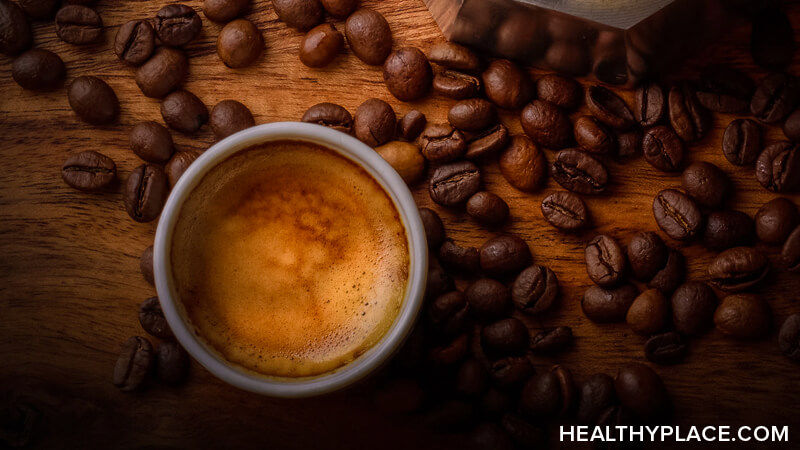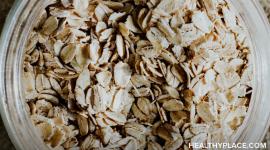The Connection Between Caffeine and Anxiety: Not Good!

The connection between caffeine and anxiety is as strong as a double shot of espresso. Caffeine stimulates the central nervous system (CNS) and therefore has a direct impact on the brain and spinal cord. The caffeine we put into our bodies irritates the CNS, leading to multiple responses. One such response is felt in the connection between caffeine and anxiety. Caffeine can aggravate existing anxiety and panic disorders, and it can contribute to the development of new anxiety. Understanding caffeine and the CNS can help you make caffeine-related decisions that are right for you and your anxiety.
The Connection Between Caffeine and Anxiety: What Does Caffeine Do?
The US National Library of Medicine’s Medline Plus lists people who should avoid caffeine. On that list are people experiencing anxiety. When you consider just a few of the effects of caffeine in the body, it makes sense. For the average person, more than 250 mg of caffeine per day (the equivalent of 1 or two cups of coffee, several cans of soda, or two eight-oz energy drinks) can cause:
- Restlessness
- Nervousness
- Shakiness or the "caffeine jitters"
- Agitation
- Pounding heart
- Sweating
- Sense of impending doom
- Fearful, worrisome thoughts and emotions
- Insomnia
These are all symptoms of anxiety. If you don’t have anxiety, caffeine can make you feel like you do, and in some cases, caffeine causes anxiety (see more foods that cause, trigger or worsen anxiety).
But why? Why is there a strong connection between caffeine and anxiety? We ingest caffeine, and it wreaks havoc.
There are many ways caffeine contributes to and aggravates anxiety. Caffeine:
- Increases stress hormones
- Reduces levels of important neurotransmitters
- Decreases blood flow to the brain
- Depletes magnesium in the body
- Depletes the body’s B vitamins
- Conflicts with female hormones estrogen and progesterone
All these effects work in concert. For example, with the caffeine-induced depletion of magnesium and B vitamins, the neurotransmitters that calm us and reduce anxiety—serotonin, dopamine, epinephrine, and gamma-aminobutyric acid (GABA)—aren’t produced in the quantities the CNS needs. GABA is associated with panic attacks; without enough of this neurotransmitter, many people become more prone to panic.
Magnesium is an important mineral that caffeine unduly excretes from the body. Magnesium plays a significant role in our mental health, including staving off depression and anxiety. The more caffeine we consume, the fewer essential nutrients stay in our bodies to feed the brain well for mental health.
Blood flow supplies the brain with everything it needs to operate well. Caffeine partially dries up this rich river, thus restricting the oxygen, water, glucose, amino acids, vitamins, and minerals the brain uses to make neurochemicals and function smoothly in all its roles. Researchers have discovered that caffeine can reduce blood flow to the brain by 27% (Addicot, et al., 2009).
Think of your own health, wellbeing, and functioning when you are dehydrated and hungry. You might get weak, cranky, have a hard time focusing and making decisions, and anxious. So does your brain, and a depleted brain can be an anxious brain.
Caffeine can cause anxiety problems in women by disrupting the production and flow of female hormones. Symptoms of both menopause and PMS—including anxiety—can worsen with caffeine consumption.
Another Reason for the Connection Between Caffeine and Anxiety
Caffeine and anxiety team up to cause angst. A big part of the reason for this is the way caffeine acts in the body and impacts the brain. Another explanation that can be relevant for some people in some circumstances is that the brain thinks there is something other than caffeine causing anxiety.
It’s a learned association, and it happens as a self-protection mechanism. Someone has a panic attack or experiences severe anxiety in a given situation. The bran associates the circumstances and the environment with the anxiety and panic, and the relationship to caffeine consumption is lost.
Of course, this isn’t always the case. It happens often enough, though, that it’s worth paying attention to. If you’re prone to panic attacks, what, exactly, is happening when you have them? Can you point to a consistent connection between caffeine and your anxiety or panic attack? For example, do you experience horrible anxiety when you arrive at work every morning? Maybe it’s situational, but is there a chance that it is courtesy of your morning coffee?
Also, watch for when your anxiety spikes. Caffeine’s effects typically peak about an hour after consumption, but the effects can last for up to six hours. If your symptoms are striking hours after that energy drink, you could be experiencing caffeine withdrawal anxiety.
Each person’s sensitivity to caffeine is unique. The knowledge that caffeine can cause new anxiety to begin and existing anxiety to worsen can be a useful tool for reducing anxiety. If you consume caffeine and experience anxiety, you might consider tapering the caffeine to see if your anxiety goes down with it.
APA Reference
Peterson, T.
(2021, December 21). The Connection Between Caffeine and Anxiety: Not Good!, HealthyPlace. Retrieved
on 2026, March 5 from https://www.healthyplace.com/anxiety/food-and-anxiety/the-connection-between-caffeine-and-anxiety-not-good



